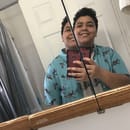My sisters and I are all mixed race kids who were adopted by two white Mormon parents. I had met a few black people here and there, but growing up in Utah with white parents who sent me to a private school, my siblings were really my only experience with black people or people of color in general. Growing up like this led to a lot of internalized racism and great confusion when it came to my identity and where I belonged.
As I study communications, I understand lack of representation says just as much as representation, not only in the media but also in our own lives. As my childhood self looked around and saw no other people like me, I wondered what was “wrong” with me. I remember looking to pop culture only to find more of the same faces I was surrounded by daily. I felt ugly, and that my hair, big nose, and dark skin would keep me from ever being considered anything more than “attractive for a black person.” Although no one ever said this to me directly, it’s what was taught to me.
I was never taught anything about black culture or what it’s like to be black. No one told me that I had my own history and ancestors. No one told me I had anything to be proud of. The people I learned about in history, of my country and religion, were all white. No one told me to be ashamed of my skin color but it didn’t feel like I was supposed to be proud. I would question what black people could do because it didn’t look they had done much. Even the stories about black people overcoming obstacles were just white savior stories furthering my doubts of my abilities as a black person.
Things got even more confusing when I found out the LDS Church did not allow black people the priesthood until 1978. No one really had a clear answer about this and I was the only one that seemed really upset by it. Being gaslit by an entire religion causes a lot of confusion and pain about your race. “Well there must have been a reason for God to keep people like me from having the priesthood,” is what I told myself, leading to more internalized racism.
All this internalized racism and ignorance about my own race has left me in a weird place. I don’t feel black enough to fit in with black people and I don’t look white enough to feel completely feel comfortable around white people. I’ve been making strides to connect to my blackness but, in fairness to myself, Utah may not be the best place to do that. I’ve also decided I’m going to talk about my experience as a black person in front of my white friends. As a note to my white friends, don’t make me educate you. Listen to my experience, but please, look for yourself. There are so many black people sharing their experiences, especially today with the internet. Listen to their voice.



